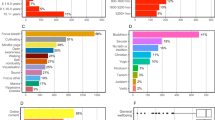Abstract
The current study examined differential patterns of interrelationships between meditators and nonmeditators on issues pertaining to psychosocial adaptation. Subjects (N=66) were randomly selected from mailing lists provided by theAssociation of Transpersonal Psychology or were solicited via classified advertising in theChicago Tribune and theDallas Morning News. The findings of the current study indicate that there are no differences between meditators and nonmeditators on level of psychosocial adaptation. However examination of the zero-order correlations between dependent measures revealed differential patterns of interrelationships within the meditator and nonmeditator groups. The findings suggest that further research is needed which expands upon the influence of meditation on psychosocial adaptation by addressing topics specific to meditative practice. The implications for the development of qualitative research methods designed to investigate psychosocial parameters in transpersonal psychology are discussed.
Similar content being viewed by others
References
Abrams, A.I. & Siegel, L.M. (1978). The transcendental meditation program and rehabilitation at Folsom State prison: A cross-validation study.Criminal Justice and Behavior, 5(1), 3–20.
Alexander C. N. et al. (1993). Effects of the transcendental meditation program on stress reduction, health and employee development: A prospective study in two occupational settings. Special issue: Stress and stress management at the workplace.Anxiety, Stress and Coping: An International Journal, 6(3), 245–262.
Beauchamp-Turner, D. L. & Levinson, D. M. (1992). Effects of meditation on stress, health, and affect.Medical Psychotherapy: An International Journal, 5, 123–131.
Castillo, R.J. (1990). Depersonalization and meditation.Psychiatry, 53(2), 158–168.
Compton, W. C. (1991). Self-report of attainment in experienced Zen meditators: A cautionary note on objective measurement.Psychologia, 34, 15–17.
Cranson, R.W., et al. (1991). Transcendental meditation and improved performance on intelligence-related measures: A longitudina study.Personality and Individual Differences, 12, (10), 1105–1116.
Davies, M. F. (1993). Dogmatism and the persistence of discredited beliefs.Personality and Social Psychology, 19(6), 692–699.
Derogatis, L. & Spencer, P. (1989).The Brief Symptom Inventory: Administration, scoring, and procedures manual. Baltimore: Clinical Psychometric.
Dey, I. (1993).Qualitative data analysis: A user-friendly guide for social scientists. New York, NY: Routledge.
Fergusson L. C., Bonshek, A. J., & Boudigues, M. (1994). Transcendental meditation and five factors relevant to higher education in Cambodia.College Student Journal, 28 (1), 103–107.
Fernandez P. R. (1990). Dogmatism and self esteem.Revista de Psicologia General y Aplicada, 43(4), 507–510.
Gilligan, C. (1982).In a different voice: Psychological theory and women’s development. Cambridge, MA: Harvard University Press.
Humphrey J. H. (1993). Stress management for elementary schools. (ERIC Document Reproduction Service No. ED 369 006.)
Isaac, S. & Michael W. B. (1985).Handbook in research and evaluation. San Diego, CA: EDITS Publishers.
Janowiak, J. J. (1993). Theoretical foundations of Yoga meditation: A contribution to self-actualization and stress management. (ERIC Document Reproduction Service No. ED 364 786.)
Jorgensen, D. L. (1989).Participant observation. Newbury Park, CA: Sage Publications.
Kohlberg, L. (1984).The psychology of moral development. New York, NY: Harper & Row.
Larsen, K.S., & Long E. (1988). Attitudes toward sex roles: Traditional or egalitarian?Sex Roles, 19, 1–12.
Laselle, K.M. & Russell, T.T. (1993). To what extent are school counselors using meditation and relaxation techniques?School Counselor, 40(3), 178–183.
Leone, C. (1989). Self-generated attitude change: Some effects of thought and dogmatism on attitude polarization.Personality and Individual Differences, 10(12), 1243–1252.
Maslow, A. H. (1972).The farther reaches of human nature. New York, N.Y.: The Viking Press.
Millon, T. (1990). The disorders of personality. In L. A. Pervin (Ed.),Handbook of personality: Theory and research (pp. 339–370). New York, N.Y.: The Guilford Press.
Pearl, J. H. & Carlozzi, A. F. (1994). Effect of meditation on empathy and anxiety.Perceptual and Motor Skills, 78(1) 297–298.
Raden, D. (1994). Are symbolic racism and traditional prejudice part of a contemporary authoritarian attitude syndrome?Political Behavior, 16(3), 365–384.
Robinson, J. P. & Shaver, P. R., (1973).Measures of social psychological attitudes. Ann Arbor, MI: Institute for Social Research.
Sakairi, Y. (1991–92). Peak experience: Its features and mental health of peak experienced meditators.Japanese Journal of Hypnosis 36 (2), 95–103.
Schulze, R.H.K. (1962). A shortened version of the Rokeach dogmatism scale.Journal of Psychological Studies, 13, 93–97.
Sethi, A. S. (1990–1991). Self transformation.Journal of Comparative Sociology and Religion, 17–18, 1–56.
Shapiro, D. H. (1992). A preliminary study of long-term meditators: Goals, effects, religious orientation, cognitions.The Journal of Transpersonal Psychology, 24(1), 23–39.
Sidanius, J. (1993). The interface between racism and sexism.Journal of Psychology, 127(3), 311–322.
Snaith, R. P., Owens, D. & Kennedy, E. (1992). An outcome study of a brief anxiety management programme: Anxiety Control Training.Irish Journal of Psychological medicine, 9(2), 111–114.
Staggers, F., Alexander, C. N., & Walton, K. (1994). Importance of reducing stress and strengthening the host in drug detoxification: The potential offered by Transcendental Meditation.Alcoholism Treatment Quarterly, 11(3–4), 297–331.
Strauss, A. & Corbin, J. (1990).Basics of qualitative research: Grounded theory procedures and techniques. Newbury Park, CA: Sage Publications.
Author information
Authors and Affiliations
Rights and permissions
About this article
Cite this article
Lepuschitz, J.K., Hartman, V.L. Meditation and psychosocial adaptation: An exploratory study. Current Psychology 15, 215–222 (1996). https://doi.org/10.1007/BF02686878
Accepted:
Issue Date:
DOI: https://doi.org/10.1007/BF02686878




